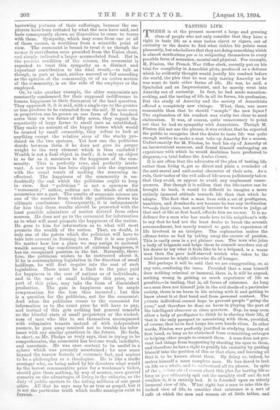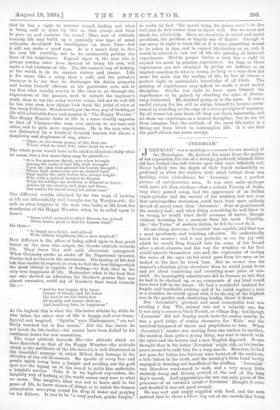TASTING LIFE. T HERE is at the present moment a large
and growing class of people who not only consider that they have a right to taste life as a man tastes claret or cigars, out of curiosity or the desire to find what tickles his palate most pleasantly, but who believe that they are doing something which is almost meritorious per 80 in subjecting themselves to every possible form of sensation, mental and physical. For example, M. Fen4on, the French War Office clerk, recently put on his trial for complicity in Anarchist plots, produced as a defence which he evidently thought would justify his conduct before the world, the plea that he was only tasting Anarchy as he was wont to taste other forms of life. He was, he said, a Symbolist and an Impressionist, and he merely went into Anarchy out of curiosity. In fact, he had made sensation- seeking, and the tasting of life in all its forms, his profession. But the study of Anarchy and the society of Anarchists offered a completely new vintage. What, then, was more reasonable than that he should "sample" the new liquor P The explanation of his conduct was really too clear to need elaboration. It was, of course, quite unnecessary to point out that he had no sympathy with Anarchists. Though M. Feneon did not use the phrase, it was evident that he expected the public to recognise that the desire to taste life was quite enough motive to make a man take up Anarchy for a season. Unfortunately. for M. Fen6on, he took his sip of Anarchy at an inconvenient moment, and found himself undergoing an experience with which he would doubtless have preferred to dispense,—a trial before the Assize Court.
It is not often that the advocates of the plan of tasting life rather than living it, get so direct and plain a reminder of the anti-moral and anti-social character of their acts. As a rule, their tastes of the evil side of life are so judiciously taken that they avoid, or appear to avoid, any unpleasant conse- quences. But though it is seldom that the life-taster can be brought to book, it would be difficult to imagine a more entirely immoral attitude towards life than that which he adopts. The fact that a man lives with a set of profligates, gamblers, and drunkards, not because he has any inclination towards their vices, but merely because he wants to judge of that sort of life at first band, affords him no excuse. It is no defence for a man who has made love to his neighbour's wife to say that he had not the least desire to break the seventh commandment, but merely wanted to gain the experience of life involved. in an intrigue. The explanation makes the offence twice as bad by taking away the excuse of passion. This is easily seen in a yet plainer case. The man who joins a body of brigands and helps them to commit murders out of his desire to try what it feels like to be a brigand, is a worse man than the poor half-starved wretch who takes to the road because he might otherwise die of hunger.
But perhaps it will be said that we are exaggerating, or, at any rate, confusing the issue. Provided that a man himself does nothing criminal or immoral, there is, it will be argued, nothing wrong in gaining as much experience of life as possible,--in tasting, that is, all forms of existence. As long as a man does not himself join in the evil deeds of a particular society, there is no harm in his mixing with it and getting to know about it at first hand and from personal contact. The private individual cannot hope to prevent people "going the pace," and therefore he does no harm in playing the part of the intelligent observer at close quarters. Nay, he may even allow a body of profligates to think he is sharing their life, if that is the only passport to associating with them, provided, of course, that he in fact keeps his own hands clean. In other words, Feneon was perfectly justified in studying Anarchy at first hand, so long as he abstained from committing outrages or helping other people to commit them. A man does not pre- vent bad things from happening by shutting his eyes to them, and therefore he has a right to gratify his curiosity by putting himself into the position of this or that class, and learning all that is to be known about them. By doing so, indeed, he makes himself a more complete man. He has dared to look on life as a whole. and tn understand all its phases. In spite of the s, (cloys air of reason about this plea for tasting life so long as yuu ultimately spit out the naughty stuff and do not swallow it, it is entirely bad. It is founded. upon an utterly immoral view of life. What right has a man to take this de- tached view of life, to consider that existence is a sort of cafe at which the men and women sit at little tables, and that he has a right to saunter round, finding out what is being said or done by this or that group, . and then to pass on and examine the next P That sort of attitude towards life may build up a cynically wise type of mind --Goethe developed his intelligence on these lines—but it will not make a good man. It is a man's duty to live his own life worthily, not to be continually pawing the lives of his neighbours. Depend upon it, the man who is always tasting other lives instead of living his own, will make a bad business of life. The life-taster's way of looking at the world, is in its essence vicious and insane. Life is far more like a camp than a café, and the private's business is to see that he discharges his duties properly and makes himself efficient at his particular arm, not to try first what cavalry service is like, then to go through the experiences of the gunner, next to sample the engineer's work, then to try the army service corps, and not to rest till he has also seen how things look from the point of view of the camp-follower. Wordsworth put the true way of looking at life with admirable force and passion in " The Happy Warrior," The Happy Warrior looks at life in a sense exactly opposite to that of Ulysses,—the man ever anxious to see men and cities, and to gain more experiences. He is the man who is not distracted by a hundred feverish fancies, but shows a simplicity and singleness of aim, who- " Plays, in the many games of life, that one
Where what he most doth value must be won."
The whole poem would have to be cited to illustrate fully what we mean, but a few more lines may be quoted:- " It is the generous Spirit, who when brought Among the tasks of real life, hath wrought Upon the plan that pleased his boyish thought ; Whose high endeavours are an inward light That makes the path before him always bright : Who with a natural instinct to discern What knowledge can perform, is diligent to learn ; Abides by the resolve, and stops not there, But makes his moral being his prime care."
The. different results obtained by the two ways of looking at life are inferentially well brought out by Wordsworth. He tells us what happens to the man who looks at life from the standpoint of the Happy Warrior, when he is called upon to face- " Some awful moment to which Heaven has joined
Great issues, good or bad for human kind." He then- " Is happy as a lover • and attired With sudden brightness like a man inspired."
How different is the effect of being called upon to face great issues on the man who adopts the Goethe attitude towards life. They leave him still cold, observant, uninspired. When Germany awoke to shake off the Napoleonic tyranny, Goethe had no share in the movement. His tasting of life had left him unable to express or even to feel the best things which the good citizen is capable of feeling,—to feel, that is, the only true happiness of life. Remember what is the best that one who showed an adoration for Goethe's genius that was almost excessive, could say of Goethe's final mood towards life :—
"And he was happy, if to know Causes of things, and far below His feet to see the lurid flow Of trouble and insane distress, And headlong fate, be happiness."
At the highest this is what the life-taster attains to, while he who takes the other view of life is happy, and even trans- figured and inspired. " Spirits," says Shakespeare, " are not finely touched but to fine issues." But the fine issues do not touch the life-taster,—his senses have been dulled by his continual desire for new sensations.
The truer attitude towards life—the attitude which we have described as that of the Happy Warrior—the attitude which is the antithesis of the life-taster's, is well illustrated in the beautiful passage in which Milton does homage to the chivalry of the old Romances. He speaks of every free and gentle spirit being born a knight and needing not the gold spur nor the laying on of the sword to make him undertake a knight's service. Take it in its highest expression, the knightly way of looking at the world comes very near to what we mean. The knight's ideal was not to learn skill in the game of life, to know causes of things or to watch the human animalcules scurrying round his drop of water and preying on his fellows. It was to be "a very perfect, gentle knight," to make in fact "his moral being his prime care,"—to live well and do well rather than to know well. But we must not speak too absolutely. Here, as elsewhere in moral and social questions, the problem is largely one of degree. Though it can never be right to treat life as if it were something meant to be taken in sips, and to regard life-tasting as an end, it would be absurd to rule out of life the gaining of innocent experiences. Within proper limits, a man has a right to expand his mind by gaining experiences. As long as those experiences are not obtained by giving an indirect or an implicit sanction to what is wrong, as long as a man does not make his main aim the tasting of life, he has of course a perfect right to accumulate knowledge of all kinds. The gaining of experiences may indeed be made a most useful discipline. Goethe was right to force upon himself the experiences to be gained by climbing the spire of Strass- burg Cathedral. He disliked going on to the spire. It was a useful victory for his will to oblige himself to become accus- tomed to standing on the edge of a sheer precipice of masonry. By all means let men learn all they can learn innocently, and let them use experience as a mental discipline; but do not let them imagine that the attitude of the mere life-taster is a fitting one from which to contemplate life. It is one that the good citizen can never occupy.



































 Previous page
Previous page